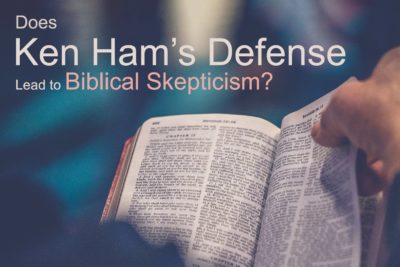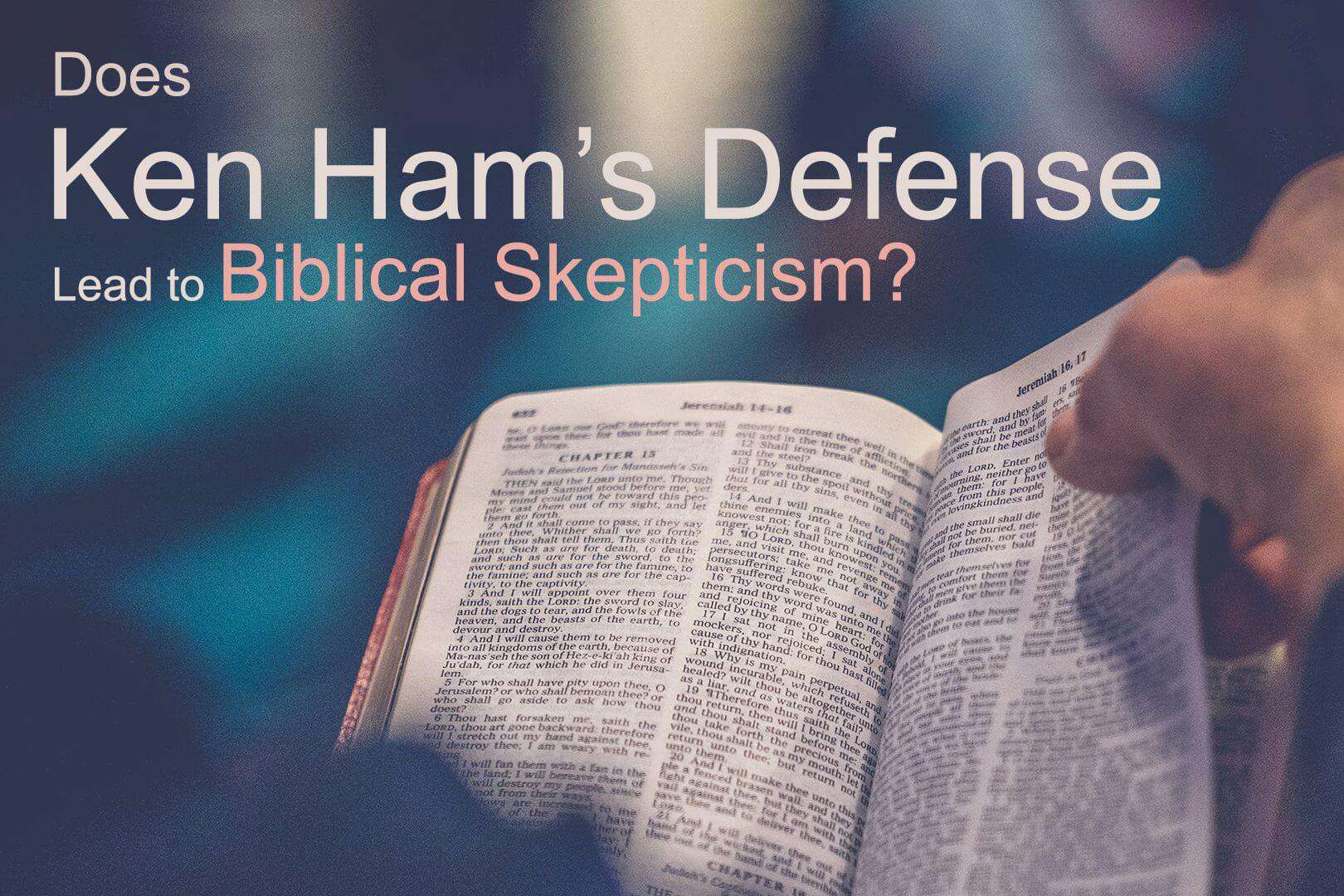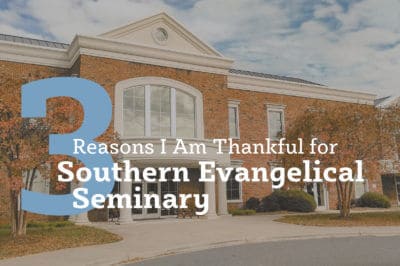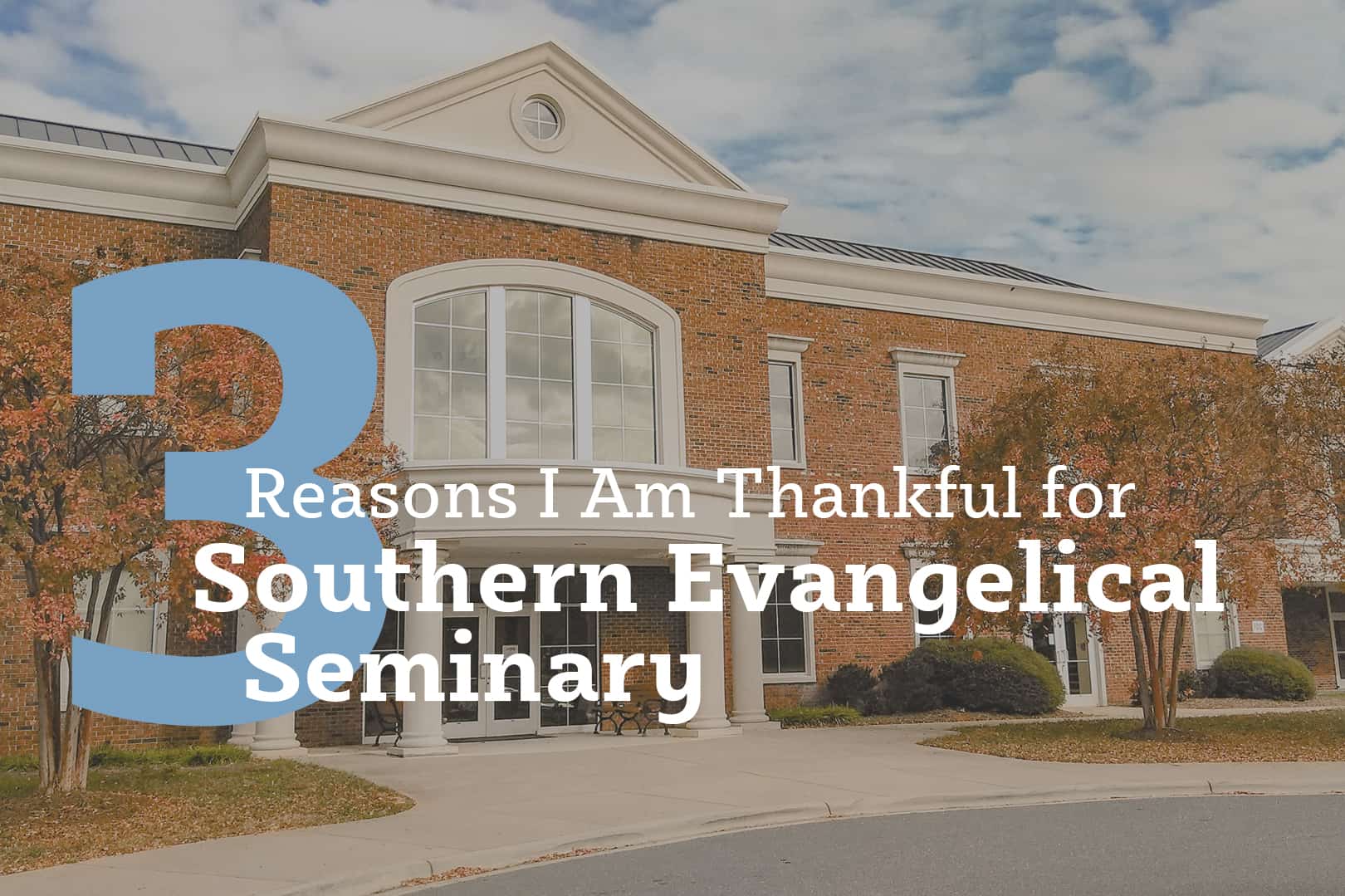
The Isle of Wisdom: Why Study in a Formal Setting?
By Jeff Lenhart, After earning a degree in Biblical Studies at an evangelical Bible College, I wanted to continue my learning. I desired to
In a world rife with sexual, moral, and theological confusion, the challenge of evangelizing the lost and empowering the saints in our post-Christian society has never been more critical. Being equipped to effectively disciple those in your care, train up your family, or simply talk about eternal things with your neighbor or co-worker can be a real challenge today without some level of seminary education. Whether you feel God leading you to pursue some form of professional ministry, or you simply want to be more equipped to teach Sunday School, talk with your coworkers, or prepare your family, there are good reasons for you to consider earning a degree or certificate from Southern Evangelical Seminary and Bible College (SES).
Christ-followers are called to combat false ideas that stand in the way of the Gospel. To effectively engage today’s cultural issues, you will need a deeply integrated understanding of theology, philosophy, and apologetics—the bedrock of a degree or certificate from SES.
To see why this is the case, consider the following. We all understand that every culture is built upon ideas, whether good or bad, that influence all aspects of life. Our modern cultural context is the consequence of numerous bad ideas playing themselves out which have resulted in a society that views Christianity very differently from years past. For example:
There are many reasons why people reject Christianity, some of which are emotional and willful. Nevertheless, when “nones” were specifically asked why they reject Christianity, their answers reveal the fact that they simply don’t think Christianity is true! Instead, many often think one or more of the following:
Why should anyone in a highly-educated, scientific, “tolerant,” and technologically-advanced culture accept Christianity? Thinking well about things like logic, faith and reason, the evidence for God’s existence, and the true nature of Christianity directly address all the issues listed above. While ministry within proper personal relationships is always important, as Barna Research Group has observed,
“… our research suggests that most of the efforts of Christian ministries fail to reach much beyond the core of ‘Christianized’ America. It’s much easier to work with this already-sympathetic audience than to focus on the so-called ‘nones’. … Christians for whom ‘ministry is about relationships’ may be disappointed when they find that many skeptics are not as enamored of relational bonds as are those who are already a part of church life. … New levels of courage and clarity will be required to connect beyond the Christianized majority.” 3
Rather than run from bad ideas, believers are called to courageously be salt and light wherever they may find themselves (Matthew 5:13; Acts 17; 2 Corinthians 10:5; Titus 1:9; 1 Peter 3:15; Jude 3). SES co-founder, the late Dr. Norman Geisler, said,
“Apologetics is simply to defend the faith and thereby destroy arguments and every proud obstacle against the knowledge of God. It is opening the door, clearing the rubble, and getting rid of the hurdles so that people can come to Christ.”
Do you currently have easy access to in-depth study taught by well-trained teachers on such relevant issues as atheism and skepticism? How about ethical concerns such as critical race theory, same-sex marriage, gender identity, and the right to life? What about reasons and arguments for the existence of God? What about the possibility of miracles? How about the problem of evil, the reliability of the Bible, or the historicity of the resurrection of Jesus? What about other religious movements such as Mormonism, Jehovah Witnesses, “progressive” Christianity, or Islam? The topics and issues needing to be addressed today could go on and on.
More than likely, you are not receiving adequate and in-depth training in these areas without seminary education. And yet these are the very issues challenging the Christian faith in our country and world. As SES Provost Dr. Richard Howe says, “Good theology is essential to good discipleship.” The following information is intended to help you consider three reasons why a seminary education may be right for you, and of course, there are other questions to consider when it comes to seminary. More specifically however, this resource is intended to communicate the importance of a special kind of in-depth seminary education.
SES offers students something that cannot be found anywhere else—accredited degrees and certificates that intentionally weave together the indispensable components of philosophy (thinking well about reality), theology (thinking well about God and Christian doctrine), and apologetics (winsomely defending the truth of Christianity). This deep and unique integration woven throughout each SES program will help you form a complete and systematic Christian worldview via seminary education.

Please thoughtfully and prayerfully consider the following points, and know that we stand ready to come alongside you in your journey with seminary education.
You may or may not intend to be a professional Christian apologist, minister, or teacher. You may be just like hundreds of other seminary students who simply want to learn more and be better equipped so Christ might use them more effectively in ministry. But you can do that on your own, right? Well, sort of.
Before they go to seminary many people read books on apologetics and listen to or watch many talks, lectures, debates, etc. You may realize the Lord is using you, but more than likely you also think that you’re missing something. Students studying to be schoolteachers, scientists, lawyers, doctors, or any number of professions don’t learn their skills simply by reading books and listening to inspiring talks. Please understand, there is an important role for books, podcasts, conferences, etc. After all, SES hosts many events including the annual Steadfast National Conference, publishes a blog and podcast, and even has a smartphone app with over 500 hours of free content. Nevertheless, when Dr. Geisler was once asked, “Why is that not in the textbook?” (a textbook Dr. Geisler actually authored), he quickly responded,
"Not everything is in the textbook; this is why we have class!"
You may like theology, philosophy, or apologetics, use the disciplines in ministry, and see the increasing need for them, but for whatever reason you haven’t considered taking the next step that reveals the value and importance of professionally studying these subjects to maximize your effectiveness in whatever ministry context you may find yourself. Just know that “not everything is in the textbook!”

Some learning will only be achieved in a controlled education setting with standards by which you are held accountable and by which your achievement is measured. Textbooks and talks alone will not give you that. While in seminary, you should experience constant correction and being put in uncomfortable, but safe, positions so you can learn from failure as well as success in a way that the knowledge and practice of the subject becomes second nature.
“If I knew a fraction of what I know now, it could have saved me from 10 years of atheism, and what I know now is only a fraction of what SES has to offer. I was looking for answers that no one could give me, and then I found SES.”
SEAN MURPHY, SES Student
Self-taught study in theology, philosophy, and apologetics, while usually better than no study at all, lacks focused training and an overarching structure that combines theory and practice in order to impact the breadth and depth of your ministry. It may produce knowledge, but self-study usually never rises to the proper level of insight, understanding, and wisdom in the practice of these disciplines.
“I had high hopes when I applied [to SES], but they have been far exceeded. Thank you so much for putting together a program that is both intellectually challenging and applicable in the contemporary landscape. Joining SES has been the highlight of my academic career!”
KRISTEN DAVIS, SES Student
At SES, we have never given up on our emphasis of apologetics and evangelism training. It is interwoven into all of our degrees and certificates. We don’t merely offer courses in theology, philosophy, and apologetics. Rather, as we’ve said, these disciplines are woven throughout each of our seminary education programs to form a cohesive and systematic understanding of reality as a whole. SES faculty and staff connect with you on your journey to advise, affirm, and mentor you along the way. Our focus is on discipleship and leadership training to multiply the effectiveness of your personal and professional ministry.
“Apologetics wasn’t a side issue. It was the … essence of the ministry I was doing. … I’m finding out more and more how important it is to be trained in order to pick up on these philosophical problems to answer the real question that’s at hand.”
ANTHONY MILLER, SES Student
“I can’t recommend SES any more highly. … There’s no better place to come to get to know God and make Him known.”
DR. FRANK TUREK, SES Alum & Adjunct Professor, President of CrossExamined.org

By Jeff Lenhart, After earning a degree in Biblical Studies at an evangelical Bible College, I wanted to continue my learning. I desired to

[et_pb_section bb_built=”1″][et_pb_row][et_pb_column type=”4_4″][et_pb_text _builder_version=”3.0.67″ background_layout=”light” text_orientation=”left” border_style=”solid”] As anyone who attends the Southern Evangelical Seminary National Conference on Christian Apologetics knows, SES does its best

It started with a Sunday night Bible course on apologetics taught by Dr. Norm Geisler. “That really captivated me.” Christina was raising five young children

By Jeff Lenhart, After earning a degree in Biblical Studies at an evangelical Bible College, I wanted to continue my learning. I desired to

[et_pb_section bb_built=”1″][et_pb_row][et_pb_column type=”4_4″][et_pb_text _builder_version=”3.0.67″ background_layout=”light” text_orientation=”left” border_style=”solid”] As anyone who attends the Southern Evangelical Seminary National Conference on Christian Apologetics knows, SES does its best

It started with a Sunday night Bible course on apologetics taught by Dr. Norm Geisler. “That really captivated me.” Christina was raising five young children
If you’ve read any books on, or just watched others do, apologetics then you’ve probably discovered that not everyone is teaching or doing apologetics the same way. You may not yet know why or be able to discern all the different ways of doing apologetics. You may not even think it is important. However, nothing could be further from the truth. Typically, only after studying the history and controversies related to the subject under professors that know the right way from the wrong ways to defend the faith will you be able to see the importance of what is known as classical apologetics. You will understand how apologetics supports and integrates into classical theism and all other subjects to create a systematic and defensible approach to Christianity. In addition, you will be motivated to learn it more effectively, efficiently, and comprehensively and be aware of the dangers inherent in certain other methods of defending the Gospel.

Apologetics answers questions about Christianity (1 Peter 3:15), and it can build a positive case for the Christian faith (Luke 1:4). But this is clearly different from evangelism or proclaiming the Gospel (1 Corinthians 15:1-4). Evangelism is done any time, any place, to anyone, in any conversation. Apologetics is only done when and if needed for unbelievers or even believers and is used to defend the faith or strengthen the faith.
To counter today’s postmodern world, you need to defend truth as absolute and knowable. Our culture often says that beliefs about religion or God are subjective: true for you but not necessarily for them. But if truth corresponds to reality, the way things are, then truth is grounded in the objective world everyone is able to know. The law of non-contradiction shows us that opposite ideas can’t both be true at the same time and in the same sense/relationship. So if “C” (Christianity) is true, then all “non-C,” anything opposed to “C,” is false. The truth is, there is no such thing as a relative truth. Relativism is self-defeating, as it assumes relativism is true for everyone (i.e., absolute), which is nonsensical.
If our second point is correct, then we can reason from a changing reality to an unchanging cause of all things. The traditional arguments for the existence and nature of God are not dead if truth is absolute and knowable. This is so because, regardless of one’s worldview, all humans share a common nature and have the same kind of human intellect. Therefore, everyone has access to knowing truths about the same reality and can martial such knowledge to demonstrate the existence of God. Moreover, we must connect such arguments with the theistic nature of the God of the Bible (Exodus 3:14) and show that there can be only one such Being (God) who is necessary, eternal, all-knowing, and all-powerful.
Given points two and three above, it is possible to show that no opposing view of God is true or can be true. Atheism, the view that there is no God, and Pantheism, the view that God is identical to creation, are false if Theism (there is one transcendent God) is true. This, therefore, provides the context to understand everything else in the world, including science and history.
An apologetic must connect the theistic view of God to the historical truth of the New Testament by showing that Jesus claimed to be God, fulfilled prophecy by rising bodily from the dead, and taught that his apostles had the same God-breathed inspiration and miraculous power as the Old Testament prophets.
Only upon these premises can we rest the claim that Christianity is true and everything opposed to it is false. Yes, there are difficult passages in the Bible, but the plain things are the main things. Yes, truth exists outside the Bible, but nothing can be true that contradicts the Bible since Jesus, the Son of God, taught it is the Word of God (John 17:17).
The internet has certainly made that possible to a degree. Yet, because not all apologetic methodology is created equally, it can be a blessing or a curse. Therefore, we encourage you to evaluate apologetics programs, ministries, and materials to make sure that they do not miss these five important things so that your faith, and the faith of those you disciple, will not be compromised.
"Rightly understood, apologetics is not a grab bag of ad hoc moves designed merely to win over converts by whatever means are at hand. It is not a kind of rhetoric. It is a kind of science, in the broad sense of a systematic body of objective knowledge. It has a philosophical foundation and a logical structure, a proper ordering of topics integrated into a theoretically coherent whole. It contains no gaps that require that the chain of logical argumentation suddenly be interrupted, and the intellect turned off so that will or emotion can take the reins. And if it is not treated this way -- as a serious intellectual enterprise -- it will not be taken seriously by most intelligent people, and will not deserve to be."
DR. EDWARD FESER, Christian Philosopher
By Richard Howe Ph.D, First Things The title of this work1 is occasioned by my increasing concerns about the nature and degree of the apologetic

By Chris Van Allsburg, Recently, Reformed theologian and presuppositionalist K. Scott Oliphint [1] criticized Southern Evangelical Seminary (SES) for holding to the classical method in apologetics

At a time when the Bible is being ridiculed on multiple fronts both inside and outside the church, I appreciate Ken Ham, president and founder
By Richard Howe Ph.D, First Things The title of this work1 is occasioned by my increasing concerns about the nature and degree of the apologetic

By Chris Van Allsburg, Recently, Reformed theologian and presuppositionalist K. Scott Oliphint [1] criticized Southern Evangelical Seminary (SES) for holding to the classical method in apologetics

At a time when the Bible is being ridiculed on multiple fronts both inside and outside the church, I appreciate Ken Ham, president and founder
You may indeed be struggling with valid questions like, “How will I pay for this?” or, “How will I find the time?” Certainly, only by God’s grace and providence will this happen, and we do not counsel anyone to go into debt or sacrifice their family for a seminary education. Even with the challenges of time and money, most who have studied formally theology, philosophy, and apologetics will agree that going to seminary was one of the most important things they ever did, and they would do it again if needed. Most things in life that are truly helpful, worthwhile, and lifelong take time, effort, and commitment to have any payoff. A theological seminary education is no different. Hence, that diploma is a valuable historical record of your learning experience.

It is interwoven throughout and holds all truth together. Theology is possible because philosophy can demonstrate the existence and nature of God without relying on the Bible. Yet, it gives us the tools needed to explore the existence of God’s nature, which is in unmistakable agreement with the God of the Bible. Philosophy also shows how we can meaningfully use language to speak about God, while recognizing that finite minds will never exhaust His majesty. The philosophical supporting of theology is just one unique and important aspect for which SES is known. True philosophy will always support the theological endeavor. Without this, one is more likely to support theology with wrong reasoning or see no reason at all for some theological assertions.
Many who go off to secular colleges and universities have taken religion or Bible classes from a liberal professor. However, after hearing SES professors like Dr. Thomas Howe, you realize your education in the Bible has been a half-inch deep (maybe less) and three miles long (or longer). It simply has no depth. Our professors provide amazing insights into the structure of the biblical books, explain how to deal with difficult passages, and demolish critical theories that undermine the inspiration and inerrancy of the Bible.
Ignore theology’s history and you might be led into error, or worse. Many cults and false teachers today are just repackaging errors found in dusty books. We must know our history and tradition, respect it and learn from it, but also bring it to the bar of Scripture. Because of the Reformation, we can rest assured the five Solas (Scripture alone, faith alone, grace alone, Christ alone, and glory to God alone) will continue to be known if we have the Bible in the language of the people. You will treasure the Bible more and not complain of so many translations when you realize the price paid to put it in our tongue. Indeed, because men of God paid with their lives, the torch of God’s grace has not gone out, and you are able to study your Bible.
Many today continue to hold to the inspiration and inerrancy of the Bible because of Christian apologetics. Apologetics must begin with reality or truth common to all, not just the Bible. It must dig deeply into philosophy, science, and history and pull out demonstrations for the truthfulness of Christianity.
One old but common objection to apologetics heard in church even today says, “The Bible, the Word of God, does not need to be defended. It is like a lion; all you need to do is let it loose.” Dr. Geisler insightfully answered this by saying, “The Word of God does not need a defense, but that statement ‘the Bible is the word of God’ needs a defense.” Otherwise, we would have no answer to other religions who claim their book to be the “word of God.” Indeed, we fear a lion only because we already know what a lion can do.
The problem with some people’s theology before seminary was that it did not have enough “systematic” in it. Granted, it may lack some “theology” too, but it is the systematic that makes everything stick together or make sense. Only systematic theology integrates truth outside the Bible with truth inside the Bible to give a coherent and full expression of all God’s revelation found in the created world and in the inspired Word. When we finally see how one doctrine affects another, then we understand that there is nothing more important for developing a true understanding of Christianity and the world.
For example, SES seminary education emphasizes the important philosophical and theological truth that God exists as pure actuality (Pure Act) with no potentiality to change. We emphasize this because upon this truth hangs all the attributes of God. To not make sure all theological reasoning adheres to this truth is to steer in the direction that makes God a mere angel or Superman. Likewise, we teach the importance of consistently applying the historical-grammatical method of interpretation to arrive at a correct understanding of every biblical doctrine. To not do so is to swerve theology in the direction of spiritualizing the scriptural text. As one SES student observed,
“I simply could not be doing what I am doing, the way that I am doing it, without the training I received at SES. … I learned how to think through issues in a way that is simply foreign to most Christians, including graduates of other seminaries.”
It is a heavy order to think you will be involved in providing theological education to the next generation. Such a responsibility must be taken seriously as teachers will incur a stricter judgment (James 3:1). We hope you take your theological education seriously and be thankful it is not deficient or missing from your particular ministry context. One SES grad put it this way,
“The integrated approach of synthesizing a sound philosophy with classical apologetics and a cohesive, biblical theology is probably the thing I love most about SES. The value of such a systematized and integrated approach for one’s apologetics, ministry, and personal growth is difficult to explain until you have experienced it for yourself.”

Attending seminary, earning a degree in philosophy, and now working in a ministry capacity for that seminary were never things on my radar screen when

It was 2004 and I was about to graduate from Lee University with a degree in history. I had just gotten married. While I planned

At 48 years old, Nora went to seminary. Her kids were grown, and she and her husband Duke had been teaching Sunday school for nearly

Attending seminary, earning a degree in philosophy, and now working in a ministry capacity for that seminary were never things on my radar screen when

It was 2004 and I was about to graduate from Lee University with a degree in history. I had just gotten married. While I planned

At 48 years old, Nora went to seminary. Her kids were grown, and she and her husband Duke had been teaching Sunday school for nearly
